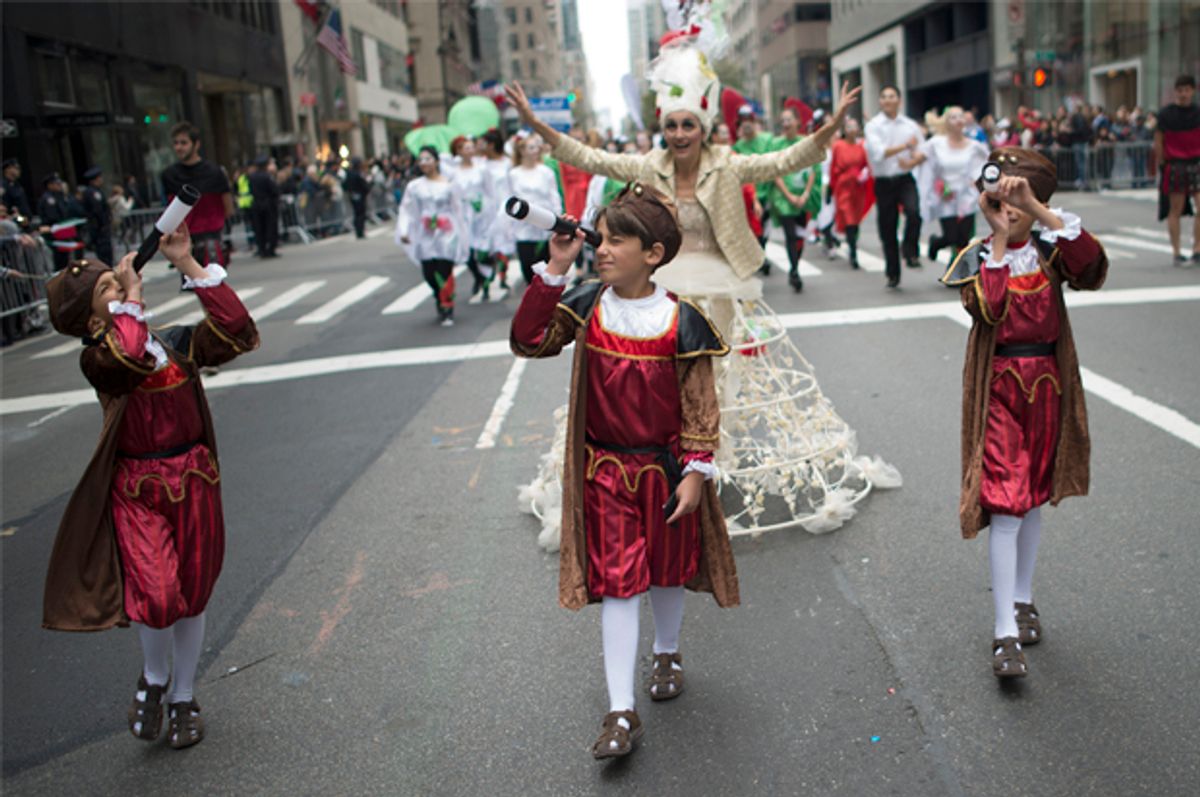For much of her life, Ica Joy’s heritage was stolen from her. Now, due to recent decisions by the cities of Minneapolis and Seattle, Joy has hope that others like her may live the childhood she was never allowed to have. While much of the country is calling today, October 13th, Columbus Day, it's being recognized in Minneapolis and Seattle as Indigenous People’s Day. The day is meant to honor the nation’s 5.2 million Native Americans.
The day is also a statement that there are better historical figures to honor than a man who never set foot in North America, who killed, raped and enslaved people on the islands he did visit, and who is seen by many as the mascot for violent European colonialism.
It’s a small step in the right direction, says Joy, a Native American from Redwood Falls, Minn. She grew up, a young Native American, bouncing from one foster home to another, while her abusive Caucasian foster parents did not allow her to acknowledge her background. They wanted her to grow up Caucasian. They told her she had dark skin because she was German, and they punished her if she tried to learn the truth.
When Joy came to a loving family at age 13, she wanted to learn everything she had lost. She dove in headfirst. She devoured books about her people’s history, learned to dance at local powwows, and endlessly quizzed tribal elders on what it was like for them growing up, on ceremonies, on the struggles they went through.
But at school, she was dismayed to learn the history of her people was whitewashed from the history books, just as it was from her childhood. She found so much ignorance, so many classmates who lived six miles from a major reservation, but only knew Native Americans through stereotypes and offensive sports mascots.
Worse, she met many fellow Native Americans who knew their heritage only from these negative images, who knew nothing of the Trail of Tears and the Massacre at Wounded Knee and the way the American government forced Native Americans onto reservations like they were some secret to be hidden.
This is why many Native Americans bristle when students are taught how Columbus discovered the New World, as if the people who had existed prior to his landing meant nothing.
“It’s difficult to imagine, if you are from a mainstream experience, how to it feels to sit in a classroom and be told, ‘Oh yeah, well there was this darkness. Then Columbus came. Then there was light,’” Rep. Keith Ellison, one of the driving forces behind the Minneapolis resolution, said. “How dehumanizing it is to feel that way.”
The states of Alaska, Hawaii, Oregon and South Dakota do not recognize Columbus Day at all. And cities such as Berkeley, Sebastopol and Santa Cruz, Calif.; Rochester, Minn., and Dane County, Wisconsin have changed to Indigenous People’s Day or something similar.
Some Italian-Americans and others object to the name change, deeming it political correctness. If Columbus Day needs a name change, they say, so does the District of Columbia; Columbus, Ohio; and Columbia University.
Dr. Joseph V. Scelsa, founder and president of the Italian American Museum in New York City’s Little Italy, said Columbus represents the courage shown by immigrants, such as his ancestors, when they came to America.
“If it weren’t for this courageous European who came to these shores, 99% of us would not be here today. He must be seen in the context of his time, not ours,” he said. “What he did was bring Christian civilization to the Western World, and the benefits of that outweigh any disadvantages.”
Scelsa, who holds a doctorate in Sociology and Education from Columbia University, disputed claims Columbus directly killed anyone, while the “Incas practiced blood sacrifice and committed genocide.”
“I believe it is a travesty of justice to dishonor this courageous man who gave so much for this country, and I totally disagree with it,” Scelsa said. “There are many other ways to celebrate Native Americans, and we should, but not at the expense of Columbus.”
Still, Indigenous People Day supporters hope having a special day will open conversations that would otherwise stay hidden. Like how the poverty rate at some reservations is above 50 percent. Or how the suicide rate among children at some reservations is ten times the national average. Or how states like South Dakota remove 700 native children from their homes every year, sometimes under questionable circumstances, in a process that 90 percent of the time places them in non-native homes, where, like Joy, they lose contact with their culture, traditions, language and families.
For Joy, she hopes to have a conversation with the younger generation, a conversation about their heritage, how it should not be hidden away and how they should be proud.
“I’m just happy it's coming to light,” she says, “that people are going to know at least a little more about the truth, by recognizing Indigenous People’s Day. Children are going to ask questions, and people are going to have to give them an answer, a correct answer.”



Shares